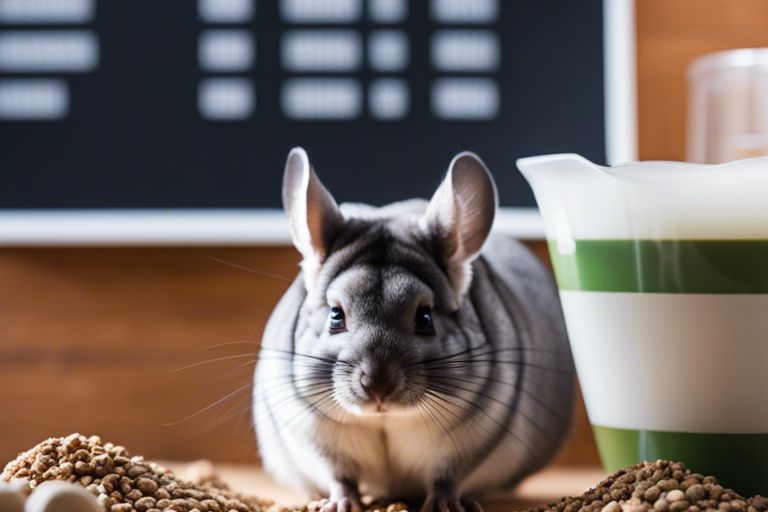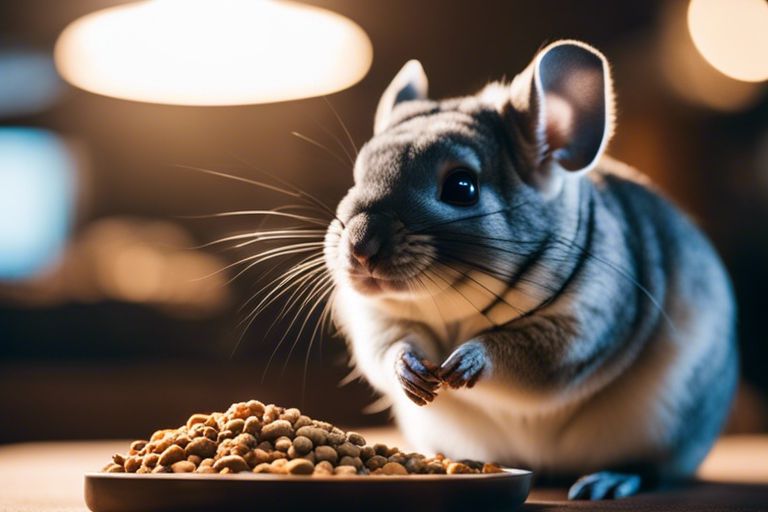Chinchillas are adorable and unique pets that require a specific diet to maintain their health and well-being. Proper nutrition is essential for these small, furry creatures to thrive and live a long, happy life. Understanding how often to feed your chinchilla is crucial in providing the best care for them. The wrong feeding schedule can lead to obesity, tooth problems, and other health issues. In this blog post, we will discuss the optimal feeding schedule for chinchillas and provide you with the essential information you need to keep your pet in the best possible shape.
Key Takeaways:
- Chinchillas should be fed hay constantly: Chinchillas require a constant supply of high-quality hay to aid in digestion and keep their teeth in good condition.
- Provide a small portion of pellets daily: Chinchillas should have a small portion of pelleted food each day to ensure they receive essential nutrients and vitamins.
- Offer fresh water at all times: Chinchillas should have access to fresh, clean water at all times to stay hydrated and maintain overall health.
Chinchilla Feeding Basics
Obviously, proper nutrition is key to keeping your chinchillas healthy and happy. Understanding the basics of feeding your chinchillas is essential to their well-being.
What chinchillas eat
Chinchillas are herbivores, which means their diet consists of a variety of grasses, hay, and high-quality chinchilla pellets. Additionally, they should have access to fresh water at all times. Hay is particularly important as it aids in digestion and helps wear down their constantly growing teeth. Avoid feeding chinchillas fruits, vegetables, and high-sugar or fatty treats, as these can upset their delicate digestive systems.
Differences between baby and adult chinchilla diets
The nutritional needs of baby chinchillas differ from those of adults. The high protein and fat content in baby chinchilla food is essential for their growth and development, whereas adult chinchillas should be fed a lower protein and fat diet to prevent obesity and other health issues.
To transition a baby chinchilla to an adult diet, gradually introduce adult chinchilla pellets and decrease the amount of baby food over a period of 7-10 days. This will help prevent digestive upset and allow a smooth transition to a more suitable diet for adult chinchillas.
Factors Affecting Feeding Frequency
Assuming you are wondering how often to feed your chinchillas, it is important to consider various factors that can affect their feeding frequency. Here are some key factors to keep in mind:
- Age and development: Chinchillas’ nutritional needs vary depending on their age and stage of development.
- Activity level and metabolism: The amount of food your chinchillas need can be influenced by their activity level and metabolism.
- Dietary needs: Chinchillas with special dietary needs may require a different feeding schedule.
Though these are just a few factors to consider, they can have a significant impact on the feeding frequency of your chinchillas.
Age and development
On the subject of age and development, it is important to adjust the feeding frequency of your chinchillas accordingly. Young chinchillas, for example, will need to be fed more frequently than adult chinchillas. As they grow and develop, they will require different nutrients and feeding schedules to support their changing needs.
Activity level and metabolism
Factors such as activity level and metabolism play a crucial role in determining the feeding frequency of your chinchillas. They are highly active animals with fast metabolisms, which means they may need to be fed more frequently compared to other pets. To maintain their energy levels and overall health, it is essential to monitor their activity level and adjust their feeding frequency accordingly.
Recommended Feeding Schedules
Now that you have decided to bring a chinchilla into your life, it is essential to understand the recommended feeding schedules to keep your furry friend happy and healthy. Chinchillas have specific dietary needs, and following a proper feeding schedule is crucial to their overall well-being.
Daily feeding routine
Recommended daily feeding routine for chinchillas includes providing fresh hay, such as timothy hay or alfalfa, at all times. Additionally, chinchillas should have access to a small amount of high-quality chinchilla pellets once a day, along with fresh water. It is important to monitor their food intake and adjust accordingly to prevent overeating and obesity.
Adjusting schedules for health and behavior
Feeding schedules may need to be adjusted for health and behavior reasons. If your chinchilla is showing signs of illness or a change in behavior, such as decreased appetite or weight loss, it is essential to consult with a veterinarian to determine if their feeding schedule needs to be modified. Additionally, if your chinchilla is exhibiting signs of aggression or stress, their feeding schedule can be adjusted to help alleviate these issues.
Adjusting schedules for health and behavior is crucial to ensuring your chinchilla’s overall well-being. By monitoring their food intake and making adjustments as needed, you can prevent health issues and improve their quality of life.
Additional Feeding Tips
For chinchillas, additional feeding tips can help ensure they are getting the proper nutrition they need. Here are some tips to consider:
- Provide fresh hay daily to support digestive health and keep their teeth worn down.
- Monitor their pellet intake to prevent overfeeding and obesity.
- Offer a variety of healthy treats in moderation to add enrichment to their diet.
- Ensure they have access to fresh water at all times to prevent dehydration.
Knowing how to properly feed your chinchilla will help keep them happy and healthy.
Treats and supplements
The diet of chinchillas should primarily consist of hay and pellets, but healthy treats can be given occasionally as a special reward. Avoid giving them sugary or fatty treats, as these can lead to health issues. Additionally, resist the temptation to add supplements to their diet unless directed by a veterinarian.
Monitoring your chinchilla’s health through diet
Monitoring the diet of your chinchilla is crucial for their overall health. This includes observing their appetite, watching for any changes in their stool, and ensuring they are maintaining a healthy weight. Any significant changes in their diet or behavior should be reported to a veterinarian for further evaluation.
More information on Monitoring your chinchilla’s health through diet
This can help prevent health issues and ensure the overall well-being of your chinchilla. Proper diet and nutrition play a vital role in keeping them happy and healthy for years to come.

Conclusion
Ultimately, the feeding schedule for your chinchilla should consist of fresh hay available at all times and a small amount of high-quality pellets once a day. It’s important to monitor your chinchilla’s weight and adjust their food accordingly to prevent obesity or malnourishment. Additionally, offering a small amount of fresh vegetables and occasional treats can provide variety in their diet. It’s crucial to keep in mind that chinchillas have sensitive digestive systems, so sticking to a consistent feeding schedule is key to maintaining their health and well-being.
